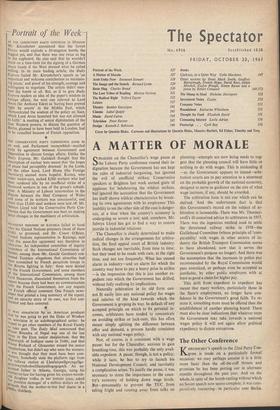A MATTER OF MORALE
SPEAKERS on the Chancellor's wage pause at the Labour Party conference roared their in- dignation because the Government has not kept
the rules of industrial bargaining, but ignored the evil of unofficial strikes; Conservative speakers at Brighton last week earned gusts of applause for belabouring the wildcat strikers, but ignored the accusation that the Government has itself shown wildcat characteristics by break- ing its own agreements with its employees. This inability to see the other side of the case is danger- ous, at a time when the country's economy is undergoing so severe a test; and, somehow, Mr. Selwyn Lloyd has got to find a way to restore morale in industrial relations.
The Chancellor is clearly determined to make radical changes in the arrangements for arbitra- tion, the final appeal court of British industry. Such changes are inevitable, from time to time; but they need to be made with care, at the right time, and not too frequently. What has caused alarm in industry—and an alarm for which the country may have to pay a heavy price in strikes —is the impression that this is just another ex- pedient into which the Government has drifted, without fully realising its implications.
Naturally arbitration in its old form can- not fit easily into any national policy for wages and salaries of the kind towards which the Government is groping its way. In default of any accepted principle on which to fix personal in- comes, arbitrators have tended to concentrate on avoiding strikes or lock-outs; this has often meant simply splitting the difference between offer and demand, a process hardly consistent with any national wages policy.
Nor, of course, is it consistent with a wage pause; but for the Chancellor, anxious to gain breathing-time, this was probably the only avail- able expedient. A pause, though, is not a policy; while it lasts, he has to try to launch his National Development Council; and inevitably a complication arises. To justify the pause, it was necessary to stress the importance to the coun- try's economy of holding down wage levels. But—presumably to prevent the TUC from taking fright and running away from talks on planning—attempts are now being made to sug- gest that the planning council will have little or nothing to do with wages. This is misleading if —as the Government appears to intend—arbi- tration courts are to pay attention to a statement on the probable growth of the national economy, designed to serve as guidance on the size of what wage increase, if any, should be awarded.
The arbitration issue is not one which can be shelved. And the unfortunate fact is that this Government's record on the subject of ar- bitration is lamentable. There was Mr. Thorney- croft's ill-conceived advice to arbitrators in 1957. There was the ingenious method used to settle the threatened railway strike in 1958—the Guillebaud Committee (whose principle of 'com- parability' with wages in other sectors of in- dustry the British Transport Commission seems to have abandoned, now that it serves the Government's purpose no longer). And there was the assumption that the increases in police pay recommended by the Royal Commission would pass unnoticed, or perhaps even be accepted as justifiable, by other public employees with at least as good a claim for higher pay.
This drift from expedient to expedient has meant that many workers, particularly those in the State's employment, no longer have con- fidence in the Government's good faith. To re- store it, something more must be offered than the establishment of another planning board. There must also be clear indications that whatever steps the Government may take towards a national wages policy it will not again allow political expediency to dictate exceptions.






































 Previous page
Previous page